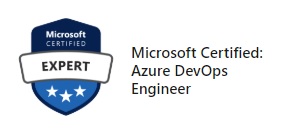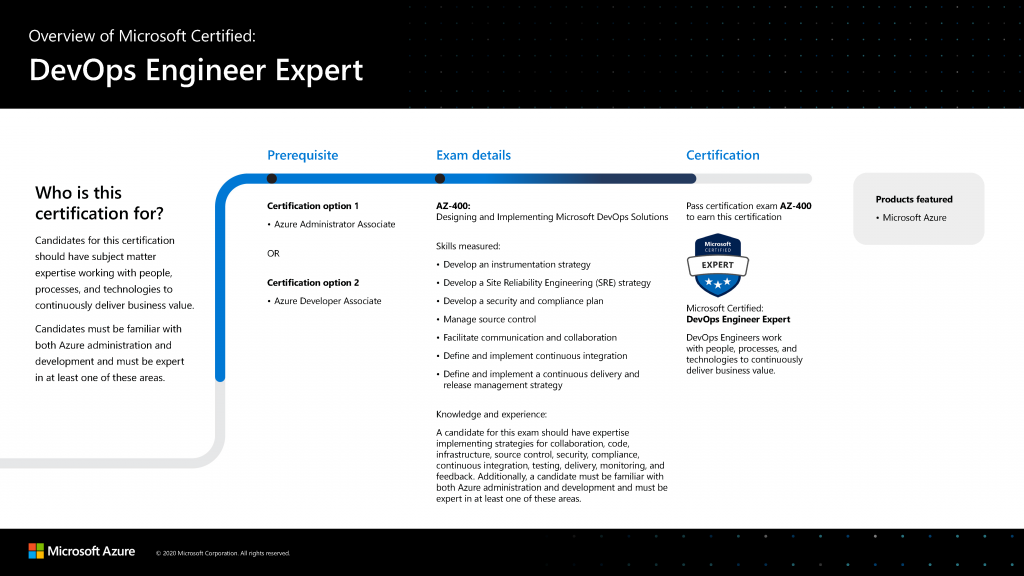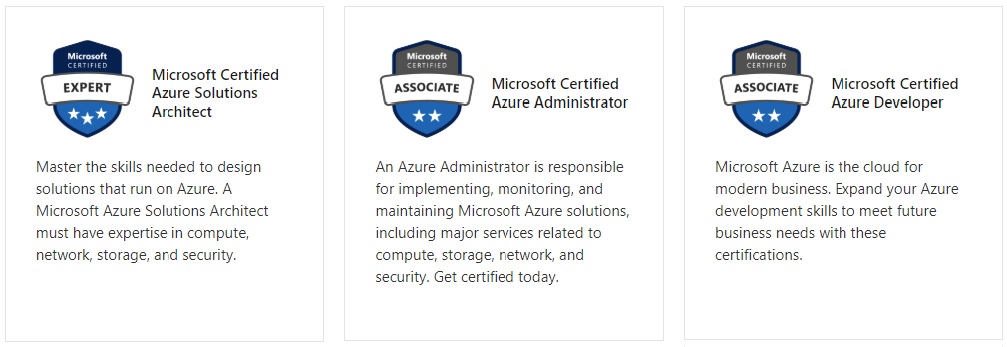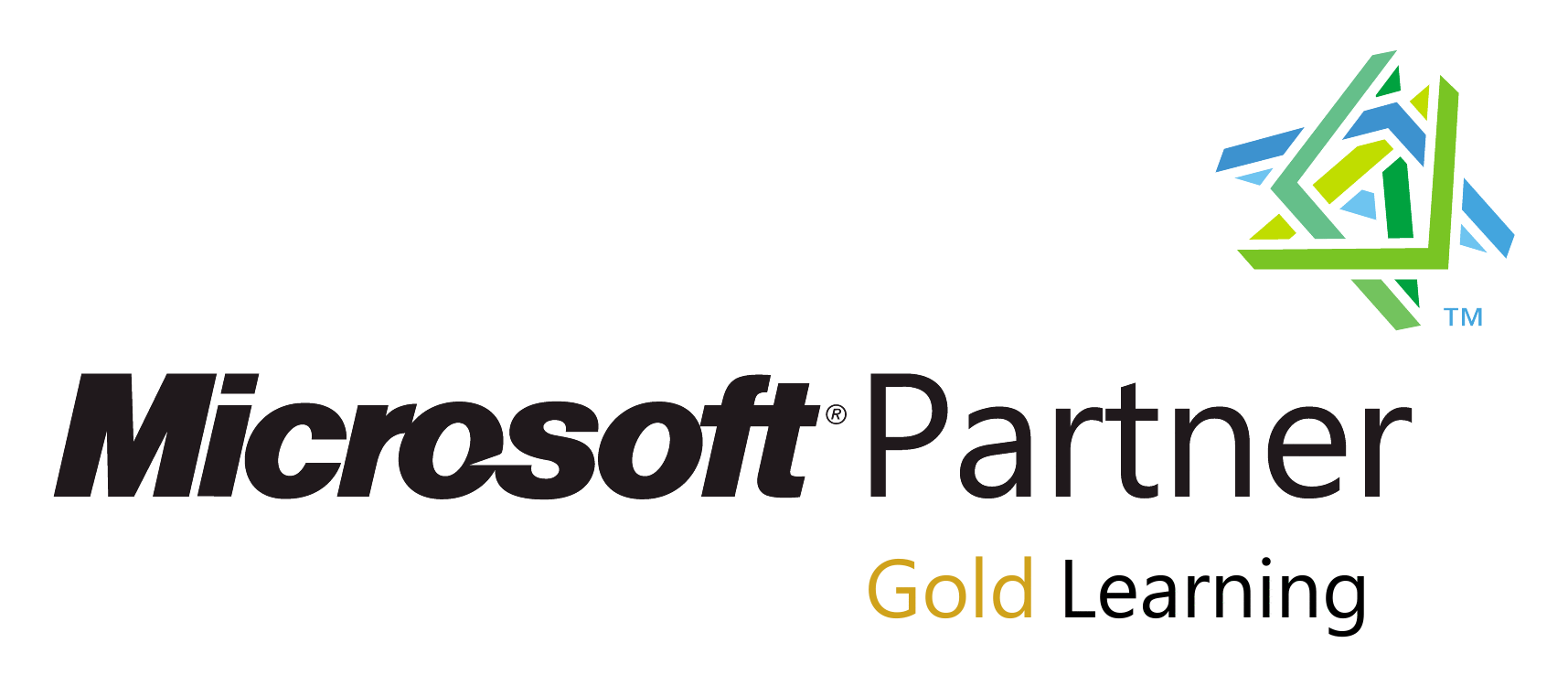MCE Microsoft Azure DevOps Training & Certification Boot Camp – 5 Days (1 Course, 1 Exam, 1 Cert)
Training Schedule and Pricing
Our training model blends knowledge and certification prep into one solution. Interact face-to-face with vendor certified trainers AT OUR TRAINING CENTER IN SARASOTA, FL - OR - attend the same instructor-led live camp ONLINE.
-
May132024Delivery Format:CLASSROOM LIVEDate:05.13.2024 - 05.17.2024Location:SARASOTAPrice Includes:Instructor Led Class, Official Courseware, Labs and Exams$3,9955 days
-
Jun102024Delivery Format:CLASSROOM LIVEDate:06.10.2024 - 06.14.2024Location:SARASOTAPrice Includes:Instructor Led Class, Official Courseware, Labs and Exams$3,9955 days
-
Jul152024Delivery Format:CLASSROOM LIVEDate:07.15.2024 - 07.19.2024Location:SARASOTAPrice Includes:Instructor Led Class, Official Courseware, Labs and Exams$3,9955 days
What's Included
1 Microsoft Test Vouchers
1 Microsoft Official Course
1 Retake Voucher (if needed)
Microsoft Study Labs & Simulations
Onsite Pearson Vue Test Center
Instructor Led Classroom Training
The Microsoft Certified Expert - Azure DevOps Training & Certification 5 Day Boot Camp focuses developing knowledge and skills to implement DevOps processes and practices. Students will learn how to plan for DevOps, use source control, scale Git for an enterprise, consolidate artifacts, design a dependency management strategy, manage secrets, implement continuous integration, implement a container build strategy, design a release strategy, set up a release management workflow, implement a deployment pattern, and optimize feedback mechanisms.
The Microsoft Certified Azure DevOps boot camp is taught using Microsoft Official Courseware
AZ-400T00: Designing and Implementing Microsoft DevOps Solutions
While attending this 5 day camp - students will take one exam (AZ-400) to achieve the Microsoft Certified Expert Azure DevOps Engineer certification. This certification requires either Microsoft Azure Administrator or Azure Developer prerequisite certification. Certification Camps offers Azure Dev / DevOps combo camp.
This hands on, instructor led live camp teaches the knowledge to develop / deploy applications in an Azure environment along with the knowledge needed for the certification exams (administered while attending camp).
Skills Gained:
Plan for the transformation with shared goals and timelines
Select a project and identify project metrics and KPIs
Create a team and agile organization structure
Describe the benefits of using Source Control
Migrate from TFVC to Git
Scale Git for Enterprise DevOps
Recommend artifact management tools and practices
Abstract common packages to enable sharing and reuse
Migrate and consolidate artifacts
Migrate and integrate source control measures
Manage application config and secrets
Develop a project quality strategy
Plan for secure development practices and compliance rules
Implement and manage build infrastructure
Explain why continuous integration matters
Implement continuous integration using Azure DevOps
Manage code quality including: technical debt, SonarCloud, and other tooling solutions
Manage security policies with open source, OWASP, and WhiteSource Bolt
Implement a container strategy including how containers are different from virtual machines and how microservices use containers
Implement containers using Docker
Inspect open source software packages for security and license compliance to align with corporate standards
Configure build pipeline to access package security and license rating
Configure secure access to package feeds
Inspect codebase to identify code dependencies that can be converted to packages
Identify and recommend standardized package types and versions across the solution
Refactor existing build pipelines to implement version strategy that publishes packages
Manage security and compliance
Differentiate between a release and a deployment
Define the components of a release pipeline
Explain things to consider when designing your release strategy
Classify a release versus a release process and outline how to control the quality of both
Describe the principle of release gates and how to deal with release notes and documentation
Explain deployment patterns, both in the traditional sense and in the modern sense
Choose a release management tool
Explain the terminology used in Azure DevOps and other Release Management Tooling
Describe what a Build and Release task is, what it can do, and some available deployment tasks
Classify an Agent, Agent Queue, and Agent Pool
Explain why you sometimes need multiple release jobs in one release pipeline
Differentiate between multi-agent and multi-configuration release job
Use release variables and stage variables in your release pipeline
Deploy to an environment securely using a service connection
Embed testing in the pipeline
List the different ways to inspect the health of your pipeline and release by using alerts, service hooks, and reports
Create a release gate
Describe deployment patterns
Implement Blue Green Deployment
Implement Canary Release
Implement Progressive Exposure Deployment
Configure crash report integration for client applications
Develop monitoring and status dashboards
Implement routing for client application crash report data
Implement tools to track system usage, feature usage, and flow
Integrate and configure ticketing systems with development team's work management
Implement a mobile DevOps strategy
Apply infrastructure and configuration as code principles.
Deploy and manage infrastructure using Microsoft automation technologies such as ARM templates, PowerShell, and Azure CLI
Describe deployment models and services that are available with Azure
Deploy and configure a Managed Kubernetes cluster
Deploy and configure infrastructure using 3rd party tools and services with Azure, such as Chef, Puppet, Ansible, SaltStack, and Terraform
Define an infrastructure and configuration strategy and appropriate toolset for a release pipeline and application infrastructure
Implement compliance and security in your application infrastructure
Design practices to measure end-user satisfaction
Design processes to capture and analyze user feedback from external sources
Design routing for client application crash report data
Recommend monitoring tools and technologies
Recommend system and feature usage tracking tools
Analyze alerts to establish a baseline
Analyze telemetry to establish a baseline
Perform live site reviews and capture feedback for system outages
Perform ongoing tuning to reduce meaningless or non-actionable alerts
Microsoft offers these additional Azure certifications
Microsoft Job Role-based Azure Certifications
Microsoft has aligned Azure certifications and training to job roles - focusing on Admin, Dev or Architect.
Each certification requires 2 exams and no certification has any prerequisite certification requirements.
Certification Camps has developed a comprehensive training / delivery format which focuses on learning beyond the core content accessible to any Microsoft training provider. Our program incorporates interactive demonstrations with explanations which go beyond the content of the book. Additional content, videos, labs & demonstrations are provided to expand on advanced topics - providing additional insight and perspective. Certification Camps training is not the typical book & PowerPoint presentation found at any local training center.
As a Microsoft Certified Partner with Gold Learning Competency - we adhere to the strict guidelines, standards and requirements to use Microsoft's exclusive curriculum. More over - our standards go beyond the "minimum requirements" set forth by Microsoft Learning.
We leverage our partnership benefits of courseware customization to build end to end technology training solutions. Students gain practical skills which can be implemented immediately.
At most training centers - learning starts on the first day of class and ends on the last day. Our boot camp training program is designed to offer resources before, during and after.
CERTIFICATION CAMPS FACILITIES
CAMPUS - Certification Camps built out a stand alone training center (not a hotel conference room) with spacious classrooms, new desk, Herman Miller Aeron chairs & comfortable common areas. Each student has a dedicated desk with two monitors. Each classroom has a maximum of two rows - so everyone is able to be engaged without the "back row" feeling.
CLASSROOM EQUIPMENT - Students work on a dedicated Dell Client Desktop with 32GB memory with 512GB SSD drives - All Labs are executed the extremely fast Microsoft Data Center Hosted Lab Environment .
CAMPUS INTERNET - The campus is connected with a 1Gbps (1,000 Mbps) Verizon Fios Business Connection which provides complete internet (including VPN) access for students.
COMMON AREA - Amenties including snacks, drinks (Coffee, 100% juices, sodas, etc) all complimentary.
LODGING - We use the Hyatt Place Lakewood Ranch. This "upgraded" hotel offers extremely comfortable beds, great breakfast and very fast internet access.
NEAR BY - Many shops, restaurants and grocery options are available within walking distance. Additionally - the hotel provided scheduled shuttle services. Restaurants like Cheesecake Factory, California Pizza Kitchen, Panera Bread, Bone Fish Grill, Ruby Tuesday's, Five Guys, Chipotle, Chili's and over 20 additional choices in the immediate area.















